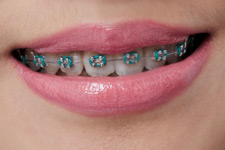The ugly appearance of throbbing canker sores after getting braces is quite common. In fact small cuts and abrasions, accidentally biting the inside of the cheek or tongue, and dental work are common triggers, and braces can be a particular aggravation. Many teens as well as adults who get braces suddenly find themselves with constant mouth sores that take a long time to heal because the metal keeps rubbing against the ulcer and irritating it. So what can you do to get off this annoying, endless cycle?
How To Heal The Mouth Ulcers You Have And Prevent New Ones
 First off, when you get new braces it is normal to have a tender mouth for a few days. After all, there was quite a bit of work going on in that small space, and it is not exactly natural to have a bunch of metal in your mouth. So it will take some time getting used to it. Unfortunately, some people get canker sores at this point because their mouth is already irritated and the painful rubbing of the metal brackets against the cheek or tongue can trigger an ulcer.
First off, when you get new braces it is normal to have a tender mouth for a few days. After all, there was quite a bit of work going on in that small space, and it is not exactly natural to have a bunch of metal in your mouth. So it will take some time getting used to it. Unfortunately, some people get canker sores at this point because their mouth is already irritated and the painful rubbing of the metal brackets against the cheek or tongue can trigger an ulcer.
So what can you do about it? The first step is to treat your current mouth sores and start the healing process. There are lots of mouth sore remedies that you can try and you can find some good ones here. Next, tackle the source of the problem, that metal jabbing into you oral tissues. Here is what most dentists and orthodontists recommend.
Dental Wax
Orthodontic Wax can be very helpful in both relieving irritation and preventing the metal from rubbing against the inside of your mouth until it’s raw. Be sure your orthodontist gives you some dental wax. Lots and lots of wax. If he or she doesn’t, then ask them for it. Don’t be shy about it. You may also be able to buy it at the drug store, and you can find it on line.
Applying the Wax
The wax comes in strips. Just tear off a strip and roll it into a little ball. To soften it further, massage it between your fingers and it will soon become nice and pliable. Then place it on the front of the irritating bracket. Be sure to press it on firmly so it stays in place. This wax will form a protective barrier between your bracket and the ulcer, kind of like a band-aid, to eliminate the irritation and giving it a chance to heal. This technique seems to work best at night when you are less able to control your movement. The problem with wax, however, is that it tends to crumble and you may end up swallowing some of it. So, consider the option below as well.
Dental Silicone – a Better Option
Some people prefer Orthodontic Silicone for braces over the wax. A popular brand name is Orthosil
. Silicone seems to stay in place better, especially while eating and drinking, even with hot beverages. It is soft and smooth and easy to apply and it’s almost invisible when on the brackets. It is, however, quite a bit more expensive than the traditional wax, although some people find they can rinse off and re-use the strips.
A helpful note about application: be sure your fingers and teeth are dry when applying the silicone, as it doesn’t stick as well when wet. It also appears to be more helpful to apply the silicone between the gum side of the bracket up the side of the bracket so it will stick better.
You may find that as time goes by you cheeks and mouth get more used to the braces and “toughen up,” making them less susceptible to getting sores. If you are experiencing a lot of painful rubbing from your braces and frequent sores, ask your orthodontist to check to see if there is a loose wire eliminate any sharp edges.





One thought on “Are Your Braces Causing Canker Sores?”